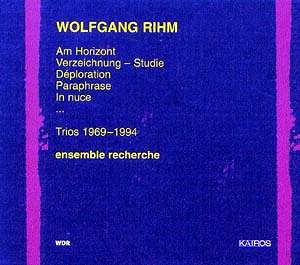RIHM
Trios 1969-1994
 Ensemble
Recherche
Ensemble
Recherche
 KAIROS 0012092KAI [71.41]
KAIROS 0012092KAI [71.41]

This is a good introduction to the development of Wolfgang Rihm (b.
1952) one of the most prolific and important contemporary German composers,
though not an easy one to come to terms with. These trios cover a twenty
five year period, from a string trio with normal grouping to the later In
nuce for the lower combination of viola, cello & bass, with its gestures
'located somewhere between sound and noise'. For the same unusual constitution
he had composed the harsh Verzeichnung-Studie of 1986, a study of
distortion in which 'everything is chiselled hard with the weightiest
compositional hammer'. They are minor works in scale but not lesser works.
Rihm is more interested in journeying than arriving; he is always reaching
out, crossing boundaries. The two earliest trios have connections with Webern
& the second Viennese School. The second of them, Paraphrase (1972)
for cello, piano and percussion is the longest, an active perpetuum mobile.
It was composed under the influence of Stockhausen, a point of repose
with 63 repetitions reflecting the beginning of Stockhausen's Klavierstucke
IX, which signalled a lifting of the ban upon serial repetition. For Rihm,
'work on this piece was a piece of self-discovery'. Deploration (1973)
in memory of Ingrid Bachman has flute with cello and percussion 'weeping
to oneself', tremoli setting the tone, cello pizzicati 'knocking
at the gates of death'. Chiffre IV (1984) for bass clarinet, cello
& piano is part of an extended cycle of related works, based on layers
of fourths and fifths, wild and furious as if striving to become a 'virtual
orchestra'. Am horizont (1991) has violin & cello placed far apart,
accordion as a mediator, tones recoloured, rich in nuances, sounding as if
microtonal, yet without quarter tones.
Challenging, often uncomfortable music which needs to be heard more than
once, a few trios only at a time. The notes, including conversations with
Rihm quoted from above, are extensive and themselves not easy to digest.
The musicians of Ensemble Recherche are amongst the best in this sort of
'cutting edge' repertoire and the recordings of 1994/96 are up to the reliably
high standard of this Kairos series.
Peter Grahame Woolf

